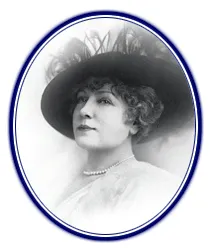A Star of Light Opera In Pittsburgh
By C. Hax McCullough, Jr.
She was a golden-haired goddess with big blue eyes, a soft, dimpled doll's face, a voluptuous figure, and a rich soprano voice. Born Helen Louise Leonard in Clinton, Iowa, in 1861, Lillian Russell was America's Queen of Comic Opera for 40 years and the most glamorous singing actress of her time.
At the age of eighteen, she made her debut as a chorus girl at Tony Pastor's in New York, performing burlesques of Gilbert & Sullivan and comic light opera.
In 1899, Russell was the toast of Broadway at New York's famous Casino Theatre and at Weber and Fields Music Hall, where she introduced the ballad "Come Down My Evening Star, " which became her personal trademark. Always in the limelight, she shocked audiences in 1904 by dressing in men's clothes and smoking cigarettes. Offstage, her four marriages and celebrated friendships (Diamond Jim Brady lavished many a jewel on her) made her one of the most talked about women of her time.On October 14, 1889, Lillian Russell performed in Pittsburgh at the Grand Opera House as Florella in Offenbach's The Brigands. The appearance confirmed her reputation as a hard-working "unselfish trooper," for she went on despite a bad cold. Asked about her, a well-known Pittsburgher noted with a smile, "She had a lot of what the men like."
She returned to Pittsburgh in 1912 under happier circumstances - as the bride of Alexander Penn Moore, publisher of the Pittsburgh Leader.
They lived in the Point Breeze section of Pittsburgh. Though her voice was gone, she remained beautiful and active. She lectured on women's rights and wrote her memoirs. She engaged in social work and wrote beauty columns for two Chicago newspapers. She died in Pittsburgh on June 6, 1922, and rests with her handsome husband in the simple Lillian Russell Moore mausoleum.